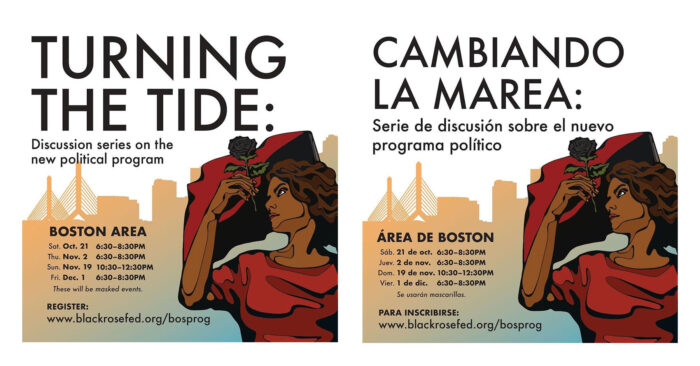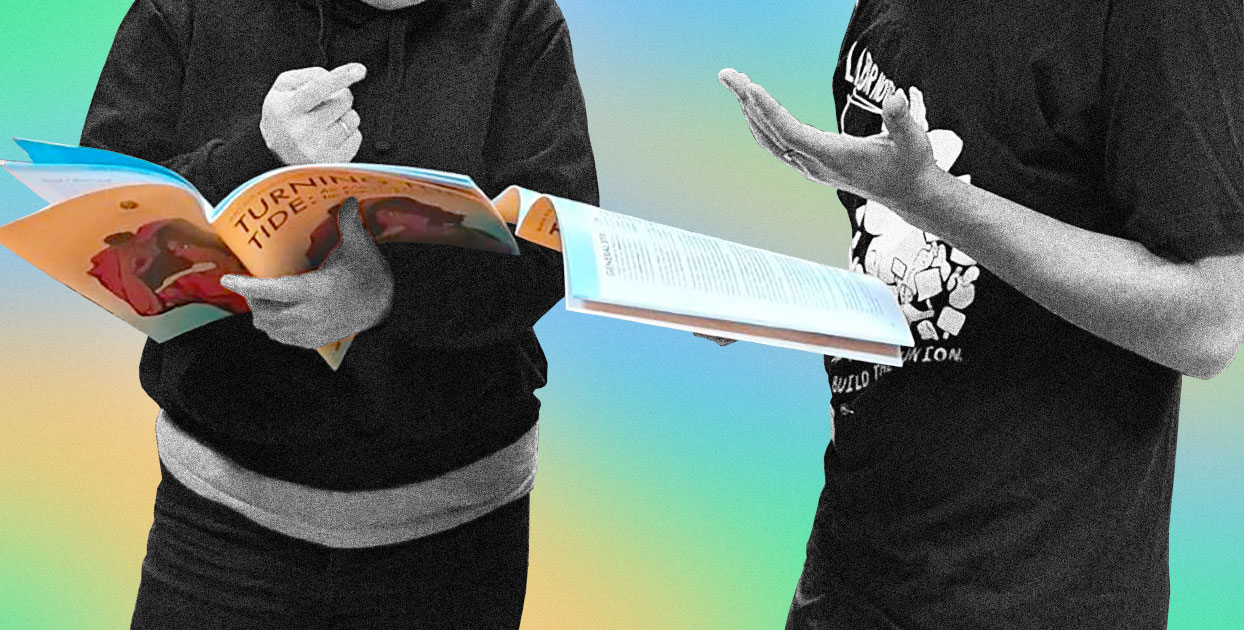by Jake Carman, with contributions from other members of the Black Rose/Rosa Negra Boston Local
Planning & Execution
Through the Fall and Winter of 2023, the Boston Local of Black Rose/Rosa Negra (BRRN) hosted a four-part discussion series on our program: Turning the Tide. The first collective effort of the newly reconstituted Boston Local, the discussion series brought 15 to 25 people to each of the meetings, with 40 or more individuals participating over the life of the series. Our goals, according to Local member Matt Tracy, were to “build connections with strangers and organizers surrounding our shared political questions, thoughts, and goals – and also try to come to a higher level of thinking and reflection regarding the program itself.” The series resulted in dozens of potential members interested in joining the Federation, a network of anarchist militants forming around us, and new local sectoral organizing projects.
Boston BRRN members spent the previous few years seeking out, developing, and strengthening relationships with other local organizers. We also made contacts at recent demonstrations, public events like the Boston Anarchist Bookfair, and through our sustained participation in a variety of social movements. We extended invitations to those who both displayed a commitment to organizing in their particular sector, as well as those who showed an interest in the politics and strategy of BRRN. We asked people to pre-register for security and to assess dietary, language, and accessibility needs. The events alternated between two different neighborhoods on opposite ends of the city, and between weeknights and weekend afternoons. We organized most of these events into separate break-out meetings, in different rooms or even different nearby buildings. This allowed for more intimate conversation with 10 or fewer people, for Spanish language interpretation, and to accommodate the different levels of knowledge on the topics at hand. Most importantly, we ensured that each session included a spread of delicious snacks.

According to the previously quoted Tracy, planning and executing the series “was relatively easy, because we started with a small group of planners who already knew each other.” One of our members developed a slide deck to facilitate conversation around elements of our program. We did not want simply to lecture to a captive audience about what our program says. Instead, embracing a popular education approach, we created opportunities for participants to express, in a collective setting, how the analyses and strategic recommendations contained in the document do or do not comport with their own experiences in social movement organizing. The slide deck included our ice-breaker and discussion agreements that we borrowed from the AORTA Collective. We also pulled quotes from the program, using them to generate prompts for discussion.
Following an initial introductory session, each subsequent session included two tracks: one for “newbies” or those who wanted to discuss the basic elements of the program and a second that focused on a more detailed examination of its arguments. We allowed participants to self-select which track they wanted to participate in and we were able to provide Spanish interpretation for those who needed it. (The slide deck and quotes for discussion are available in English and Spanish through the Federation’s External Education Committee – eec@blackrosefed.org).
Few attended the events sequentially, but many attended multiple days and all who participated walked away with an understanding of Black Rose/Rosa Negra’s strategic orientation. Aila, who attended the series, said, “I thought it was very enlightening, but also necessary. The dialogue itself with other established and new members was integral to understanding the program. Reading it in a group helps people to see themselves in the work and begin to practice this kind of organizing.”
The majority of the participants read Turning the Tide, in paper form or online. We found participants were often most interested in asking us questions about Black Rose/Rosa Negra, how the organization functions, and how one might join. While there were many questions about the political concepts we use and occasional hang ups regarding the minutia of imagining a post-revolutionary anarchist society, there was a general consensus of agreement around the goals, strategies, and tactics proposed in our program.
Aila added that “Something like Turning the Tide is so important because it is, if not foundational, very uniting. People should start to realize that we have something already that easily brings us together.”
Sectoral Breakouts
But this series functioned as more than straightforward political education. As already mentioned, we encouraged participants to assess the content of our program by connecting it to their own organizing experiences. This proved extremely fruitful. By the fourth event, participants began to develop a collective understanding of where we each fit into the broader tapestry of movement organizing in our region. This was accomplished by breaking out into three sectoral subgroups: Abolition & Safety, Housing & Territorial, and Labor.
The Abolition & Safety breakout was by far the largest. Participants discussed organizations such as the Jericho Movement, the Incarcerated Workers Organizing Committee, and others that they had been active in. Drawing on these experiences, participants began to strategize about developing areas of common abolitionist and prisoner support work.
The Housing & Territorial group included organizers currently engaged in 6 different housing or territorial organizations in different parts of Eastern Massachusetts. The group organized themselves through a signal chat and have since held two virtual meetings, and plan to gather together anarchist housing organizers to carry out collective analysis, develop and host organizer trainings, coordinate our participation across the various local social organizations, and host a public video discussion with housing organizers in Barcelona.
The Labor breakout was the smallest of the three, and while there were a handful of union members and a few organizers representing different industries, there was not enough common focus or capacity in the grouping to yet justify launching a coherent sectoral network. Despite this, the discussion of common experiences and challenges organizing at work was useful and generative.
Breaking out and then reconvening as a larger group created the basis from which we were able to better strategize about creating opportunities for multisectoral and transversal organizing.
This first iteration of our program study series wrapped up in late December with a party and a participatory retelling of Charles Dickens’ A Christmas Carol.

Conclusion
As members of the Boston Local of BRRN, our takeaway is that this event series—while requiring a significant effort to plan and implement—exceeded our expectations as a success. Not only did we create a recurring space for anarchist militants to come together in order to collectively discuss and analyze a political document, we were able to lay a solid foundation for future cross-sector organizing efforts.
We have already begun planning the next program study series and are supporting groups in other parts of Massachusetts who have approached us about doing the same. We encourage anyone interested in holding your own collective study of Turning the Tide and would be happy to provide you with the materials and support necessary to carry it out.
We look forward to hearing from you!
You can email the Boston Local of Black Rose / Rosa Negra at: boston@blackrosefed.org

